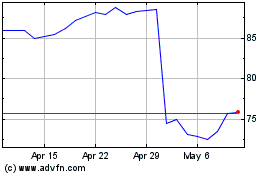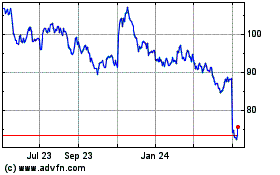Companies Move to Reprice Employees' Stock Options
September 12 2016 - 7:30PM
Dow Jones News
By Alix Stuart
Stock-option exchanges are making a bit of a comeback, despite a
strong stock market and worries about the shareholder pushback they
can generate.
Such exchanges, which let employees trade nearly worthless
options for new options or restricted stock, have been proposed or
implemented by at least 10 publicly traded companies so far this
year, according to proxy-advisory firm Institutional Shareholder
Services -- up from seven last year, and three in 2014.
Options repricing surged in popularity after the dot-com bust in
the early 2000s, then again following the financial crisis in 2009,
when many employee stock options became underwater: The company's
stock had fallen way below the price at which they had the right to
buy shares.
Eighty companies including Apple Inc., Starbucks Corp. and
Google -- now Alphabet Inc. -- allowed employees to trade in
underwater options in 2009. Back then, about 25% of companies
swapped the options without consulting shareholders, according to
ISS data.
For the most part, the trend these days is confined to younger
firms that have recently gone public, said Brett Harsen, partner
for Radford, a part of Aon Hewitt, a consulting company.
"Companies that have lower values are competing for employees
with companies with stronger equity," said Robert Finkel, a partner
with the Boston-based law firm of Morse, Barnes-Brown &
Pendleton PC. "And equity is still a very important part of
compensation, particularly for technology companies."
Shares of Jive Software Inc., a maker of business software, slid
below $4 in March from a high of $27.16 in 2012. That left more
than 25% of the options held by the company's employees out of the
money, with their strike prices far above Jive's then current
trading price.
The Palo Alto, Calif., company pitched the idea of an option
exchange to shareholders and a majority approved. Nearly 80% of
eligible options were exchanged over the past two months for
restricted stock units that vest over two years.
"We were looking for ways wherever we could to help the people
who were staying with Jive be as incented and motivated as
possible," said Bryan LeBlanc, Jive's finance chief.
In the exchange process, Jive and other companies are offering
employees restricted stock units that automatically convert to
shares in place of the options to eliminate future uncertainty.
Companies typically take great pains to ensure that exchange
terms are acceptable to shareholders as well as employees. That
means executives and directors don't participate and employees
receive a value equivalent to their initial grant. While
shareholders approve most exchanges, companies only float them when
they know such approval is forthcoming, said Mr. Harsen.
Since 2012, Jive has used restricted stock exclusively for
nonexecutive employee equity awards, said Mr. LeBlanc.
Restricted stock has become much more popular partly because it
is easier to account for. It also lowers the risk to employees.
Such options exchanges can benefit companies by reducing
compensation expenses, since companies are required to expense the
value of outstanding stock options even when they are
underwater.
And for employees who receive new options, there is no guarantee
their prospects will improve. Electronics retailer hhgregg Inc.
repriced options with a three-year vesting schedule for 58
employees on May 1, 2013 to the then-current trading price of
$13.56, according to a filing. Since 2014, the stock hasn't
returned to that level, and is currently trading around $2 per
share.
A hhgregg representative declined to comment.
The process of structuring and executing an exchange can take up
to 12 months and cost as much as $300,000, estimates Sorrell
Johnson, senior equity compensation consultant with Stock &
Options Solutions. Terms often change along the way, as an
improving or declining stock price can affect the number of
eligible options and the new strike price.
How effectively such exchanges are in retaining employees is
hard to calculate, since most companies don't disclose turnover,
which is subject to other factors in any case.
(END) Dow Jones Newswires
September 12, 2016 19:15 ET (23:15 GMT)
Copyright (c) 2016 Dow Jones & Company, Inc.
Starbucks (NASDAQ:SBUX)
Historical Stock Chart
From Mar 2024 to Apr 2024

Starbucks (NASDAQ:SBUX)
Historical Stock Chart
From Apr 2023 to Apr 2024
